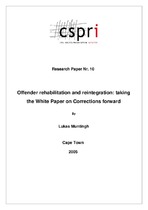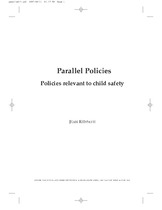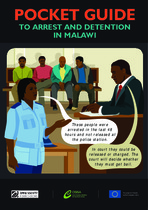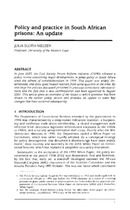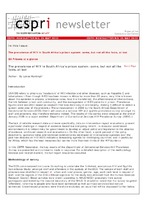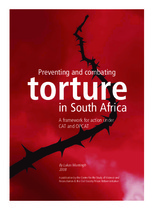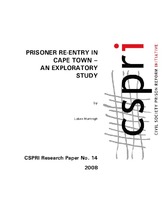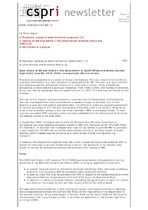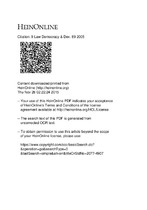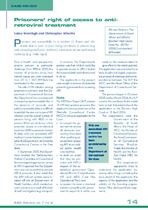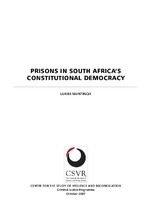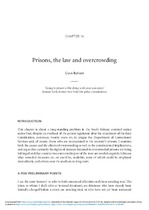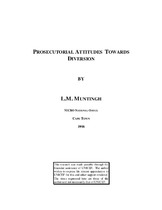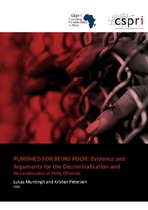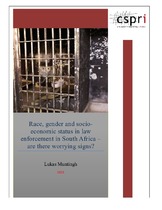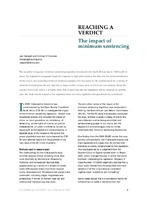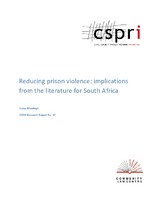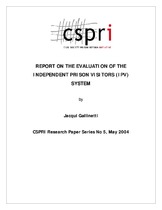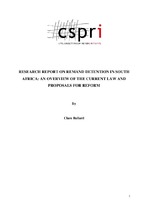Browsing Civil Society Prison Reform by Title
Now showing items 42-61 of 85
-
Offender rehabilitation and reintegration: taking the White Paper on Corrections forward
(Civil Society Prison Reform Initiative, 2005)Rehabilitation and reintegration, as contemplated on the scale articulated in the White Paper, will indeed require a very careful approach and consideration would have to be given to the major challenges, such as resource ... -
Parallel Policies: Policies relevant to child safety
(Centre for Justice and Crime Prevention, 2007)The Centre for Justice and Crime Prevention’s 2005 National Youth Victimisation Study indicated the need to explore existing policy impacting on children from a social crime prevention perspective within a rights-based ... -
Pocket Guide to Arrest and Detention in Malawi, Lilongwe
(Paralegal Advisory Services Institute (PASI), Catholic Commission for Justice and Peace (CCJP), Centre for Human Rights and Rehabilitation (CHRR), the Centre for Human Rights Education, Advice and Assistance (CHREAA), and the Community Law Centre (CLC) of the University of the Western Cape, 2015)This guide is for anyone who needs a quick reference to the laws around arrest and detention in Malawi. This may include police, court clerks, prosecutors, magistrates, paralegals and detainees. First there is an orientation ... -
Policy and practice in South African prisons: an update
(Law, Democracy & Development, 2005)In June 2003, the Civil Society Prison Reform Initiative (CSPRI) released a policy review concerning major developments in penal policy in South Africa since the advent of constitutionalism in 1994. This paper was widely ... -
The prevalence of HIV in South Africa's prison system: some, but not all the facts, at last
(Civil Society Prison Reform Initiative, 2008-05-26)The lack of reliable research data and more specifically, data on intervention impact evaluations, present a particular challenge in respect of evidence-based law and policy reform. In resource-constrained environments it ... -
Preventing and combating torture in South Africa: a framework for action under CAT and OPCAT
(Centre for the Study of Violence and Reconciliation & Civil Society Prison Reform Initiative, 2008)This booklet aims to provide more information to decision-makers and stakeholders on the challenges relating to preventing and combating torture; and also outlines South Africa’s obligations under CAT and OPCAT. These two ... -
Prisoner re-entry in Cape Town - an exploratory study
(Civil Society Prison Reform Initiative, 2008)This study is concerned with the immediate post-release period and asked a very simple question: “What happens to people immediately after they have been released from prison?” The question is aimed at gaining a deeper and ... -
Prisoners' access to anti-retroviral treatment
(Civil Society Prison Reform Initiative, 2006)Prisoners are susceptible to a number of illness and diseases. This may relate to the conditions of prisons themselves (e.g. poor ventilation is associated with TB), life style (e.g. poor nutrition and substance abuse), ... -
Prisoners' rights litigation in South Africa since 1994: a critical evaluation
(Law, Democracy & Development, 2005)It is a sad fact that there is often a huge gap in South Africa between the constitutional promise of a life lived with dignity and respect, on the one hand, and the actual lived reality of people who are supposed to be ... -
Prisoners’ right of access to antiretroviral treatment
(ESR Review, 2006)Prisoners are susceptible to a number of illness and diseases due, in part, to poor living conditions in prisons (e.g. overcrowding and poor nutrition), substance abuse and sexual violence (e.g. male rape). The rate of HIV ... -
Prisons in South Africa's constitutional democracy
(Centre for the Study of Violence and Reconciliation, 2007-10)In this article it will be argued that to make prisons compatible with a constitutional democracy, as understood in South Africa, four requirements need to be met. First, the prison system must have an underlying philosophical ... -
Prisons, the law and overcrowding
(Wits University Press, 2014)This chapter is about a long-standing problem in the South African criminal justice sector that, despite an overhaul of the prison legislation after the enactment of the final Constitution, continues, twenty years on, to ... -
Prosecutorial attitudes towards diversion
(NICRO National Office, 1998)This report investigates a number of issues relating to diversion in an effort to make certain recommendations with regard to the running and management of diversion with a particular emphasis on the discretionary powers ... -
Punished for being Poor: Evidence and Arguments for the Decriminalisation and Declassification of Petty Offences
(Dullah Omar Institute, 2015)The Ouagadougou Declaration and Plan of Action on Accelerating Prison and Penal Reform in Africa of 20031 endorsed recommendations calling for reducing the size of prison populations in Africa. The Plan of Action recommended ... -
Punishment and deterrence: don’t expect prisons to reduce crime
(SA Crime Quarterly, 2008)The belief is thoroughly entrenched that prisons fulfil the triple function of punishing offenders, making society safer by removing dangerous individuals, and deterring potential offenders from committing crime. The fact ... -
Race, gender and socio-economic status in law enforcement in South Africa – are there worrying signs?
(Community Law Centre, University of the Western Cape, 2013)In the South African context the right to equality has particular significance given the country’s history of statutory unfair racial discrimination. This paper investigates, based on quantitative data, how different ... -
Reaching A Verdict: The impact of minimum sentencing
(South African Crime Quarterly, 2007)The so-called ‘temporary’ minimum sentencing legislation introduced into South African law in 1998 is still in place. The legislation was passed largely in response to high crime rates at the time and the perceived leniency ... -
Reducing prison violence: implications from the literature for South Africa
(Civil Society Prison Reform Initiative, 2009)In the past 15 years the Department of Correctional Services (DCS) has faced numerous challenges whilst trying to re‐invent itself. This has not been an easy road and in many regards the route to penetrative transformation ... -
Report on the evaluation of the Independent prison visitors (IPV) system
(Civil Society Prison Reform Initiative, 2004-05)This report on the IPV system forms part of a larger study into civilian oversight of the correctional system. Saras Jagwanth has completed an evaluation of the Office of the Inspecting Judge, which should be read in ... -
Research report on remand detention in South Africa: an overview of the current law and proposals for reform
(Civil Society Prison Reform Initiative, 2011)The report discusses, firstly, the bail provisions in the Criminal Procedure Act with regard to the right to liberty and in the broader constitutional notion of proportionality. Second, case law from regional and international ...

